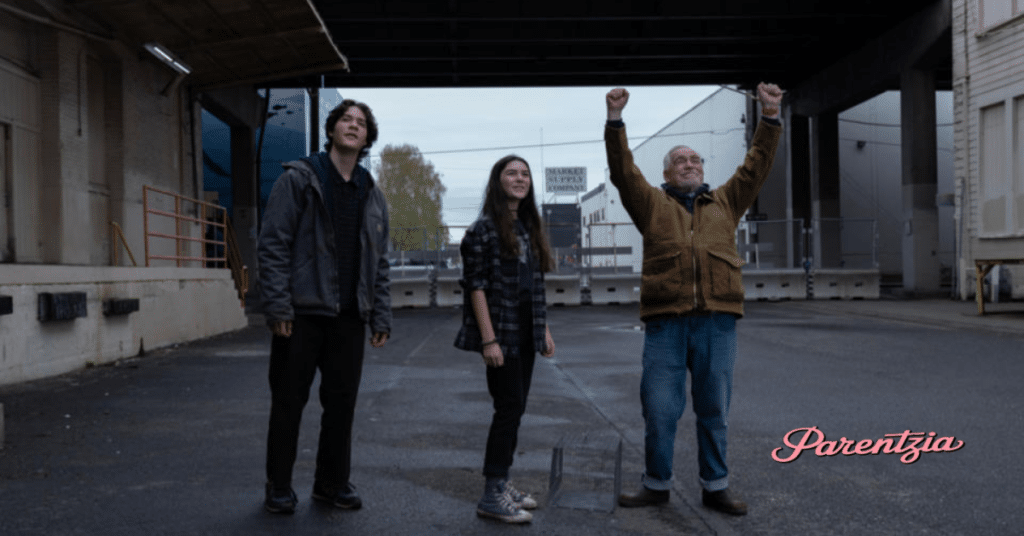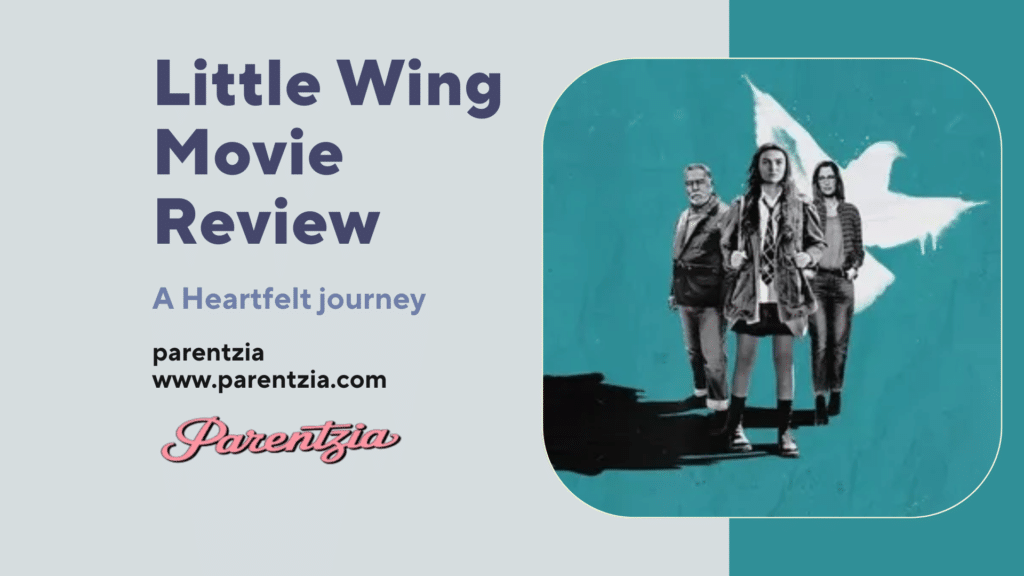The coming-of-age genre often relies on familiar tropes, but Little Wing (2024) sets itself apart by blending adolescent struggles with the unique world of pigeon racing. A Paramount+ original film, Little Wing dives deep into the heart of teenage emotions, offering a fresh perspective on growing up in the midst of family turmoil. Directed by Dean Israelite, the film delivers a poignant narrative that balances quirkiness with emotional gravity, making it a must-watch for fans of thoughtful teen dramas.
Plot Overview
At the core of Little Wing is the story of Kaitlyn McKay (played by the talented Brooklynn Prince), a 13-year-old girl dealing with her parents’ recent divorce. Life feels overwhelming, and Kaitlyn is searching for something to anchor her amidst the emotional chaos. She finds solace in a highly unexpected activity—pigeon racing. When she impulsively steals a racing pigeon, it sets her on a journey of self-discovery, responsibility, and healing.

The film doesn’t just focus on Kaitlyn’s individual story. It layers the narrative with the complexity of relationships. Kaitlyn’s bond with her mother, Maddie (Kelly Reilly), is fractured, while her father’s absence adds to her emotional struggles. However, her accidental involvement in pigeon racing introduces her to Jaan Vari (Brian Cox), a grumpy yet wise mentor who helps her navigate her personal dilemmas. Little Wing moves effortlessly between moments of humor and heartbreak, blending a unique backdrop with universal themes.
You might also like “Disneynature Tiger (2024) Review: A Majestic Journey“
Key Themes in Little Wing
Coming-of-Age and Family Struggles
At its heart, Little Wing explores the complexities of adolescence. Like many teen movies, it depicts the turbulence of growing up—finding your place in the world, dealing with changing relationships, and confronting harsh realities. The twist here is that pigeon racing, with its quiet intensity, becomes a metaphor for Kaitlyn’s journey. The races represent the inner conflicts she faces as she tries to reconcile her family situation and her own emotional struggles.
The parental divorce subplot adds depth to Kaitlyn’s story. Maddie, played by Kelly Reilly, is consumed by the pressures of single motherhood and financial strain, creating a rift between mother and daughter. Maddie’s emotional distance is evident, leaving Kaitlyn feeling neglected. The film does a brilliant job of showing how divorce can disrupt not just the physical family unit, but the emotional one too.
Friendship and Unlikely Bonds
One of the standout aspects of the film is Kaitlyn’s bond with Jaan Vari, portrayed by Brian Cox. The relationship starts on a rocky note—Jaan is initially portrayed as a grumpy old man set in his ways, resistant to change. However, as Kaitlyn enters his world of pigeon racing, the two form an unlikely friendship. Jaan teaches Kaitlyn responsibility, patience, and the value of forging connections, even when life feels isolated.
Kaitlyn’s newfound relationships also include a friendship with Adam (Che Tafari), a fellow teen who is also grappling with his own issues. The dynamic between Kaitlyn and Adam adds a lighter, more comedic touch to the movie, balancing the heavier themes with moments of genuine teenage awkwardness and camaraderie.

Performances: Depth and Nuance
Brooklynn Prince as Kaitlyn McKay
Brooklynn Prince delivers a standout performance in Little Wing, showcasing the emotional range that made her famous in The Florida Project. Here, she brings the raw vulnerability and frustration of adolescence to life. Kaitlyn’s impulsive decisions and emotional volatility make her relatable and deeply human. Prince perfectly captures the sense of being on the cusp of adulthood—feeling everything all at once but not having the tools to express it. Her scenes with Cox are particularly powerful, as they highlight Kaitlyn’s search for stability in a world that feels unpredictable.
Brian Cox as Jaan Vari
Brian Cox is a force in his role as Jaan Vari, bringing a gruff exterior that slowly peels away to reveal a character filled with wisdom and empathy. Cox, known for his role as the tough patriarch in Succession, shifts gears to deliver a performance that is both heartwarming and humorous. His mentorship of Kaitlyn feels organic, with their bond developing slowly over shared moments that involve much more than pigeons.
Kelly Reilly as Maddie McKay
While Kelly Reilly‘s character, Maddie, doesn’t get as much screen time as Kaitlyn or Jaan, her presence looms large over the narrative. Reilly excels in portraying a woman overwhelmed by life’s demands—balancing work, finances, and raising a teenage daughter on her own. Her strained relationship with Kaitlyn reflects the emotional toll divorce can take on both parents and children. Maddie is not painted as a villain but as a flawed, struggling figure who ultimately wants what’s best for her child.
The Unique World of Pigeon Racing
One of the most fascinating aspects of Little Wing is its exploration of pigeon racing—a sport rarely depicted in mainstream cinema. The film uses this unique backdrop to great effect, creating parallels between the pigeons’ instinct to return home and Kaitlyn’s desire to find stability. The races themselves are filmed with a sense of urgency and beauty, transforming what might seem like a niche hobby into a powerful metaphor for control and freedom.
Pigeons, often seen as common birds, become symbols of strength and resilience in the film. As Kaitlyn learns to care for and race them, she finds a sense of purpose and control over her own life. The birds’ ability to always find their way home mirrors Kaitlyn’s journey to figure out where she belongs, despite the upheaval in her family.
| Pigeon Racing | Teenage Growth |
|---|---|
| Skill and patience required | Adolescents learning responsibility |
| Racing toward a goal | Finding personal identity |
| Bond between pigeon and owner | Connection between mentor and mentee |
Is Little Wing Safe for Kids? (Parents Guide)
PG-13 Age Rating Explained
Little Wing has a PG-13 age rating due to its emotional intensity and thematic content. The movie delves into dark themes such as family struggles, adolescent rebellion, and feelings of abandonment. It also includes a few suicidal verbal references, which may not be appropriate for younger viewers. However, there is no explicit violence or inappropriate language, making the film suitable for teenagers who are mature enough to handle these heavier topics.
Content Considerations for Parents
For parents wondering whether Little Wing is a good fit for their teens, here are some key points to consider:
- Family Drama: The film portrays a strained mother-daughter relationship and the emotional impact of divorce.
- Teen Rebellion: Kaitlyn engages in risky behavior, such as stealing a pigeon, though these actions are portrayed as part of her growth process.
- Emotional Depth: The film’s exploration of feelings of abandonment, anger, and frustration may be too intense for younger audiences.

Overall, Little Wing provides an opportunity for meaningful conversations between parents and teens about navigating complex emotions and finding healthy outlets for frustration.
Cinematic Direction and Visual Style
Director Dean Israelite brings a delicate touch to Little Wing, balancing the film’s quirky premise with its emotional weight. His use of Portland as the setting adds a layer of moodiness to the film, perfectly matching Kaitlyn’s internal turmoil. The pigeon races, while a focal point, never overshadow the real heart of the story: Kaitlyn’s emotional journey.
The cinematography emphasizes quiet, reflective moments. Close-up shots of Kaitlyn’s face allow the audience to feel her vulnerability, while sweeping shots of pigeons flying through the Portland sky symbolize the freedom she longs for. The visual contrast between the bustling city and the peaceful world of pigeon racing adds depth to the film’s themes of isolation and belonging.
Comparisons to Other Coming-of-Age Films
While Little Wing stands on its own with its unique pigeon-racing plot, it shares thematic elements with other coming-of-age films like Lady Bird and Eighth Grade. Like these films, Little Wing tackles the complexities of adolescence, but it avoids typical clichés by focusing on a less-explored hobby that serves as a metaphor for personal growth.
| Film | Primary Themes | How Little Wing Stands Out |
|---|---|---|
| Lady Bird | Family conflict, independence | Pigeon racing as a unique narrative tool |
| Eighth Grade | Social anxiety, teen struggles | Focuses on divorce and personal responsibility |

Audience Reception and Critique
Little Wing has garnered mostly positive reviews, with praise for its performances, emotional depth, and unique premise. However, some viewers have noted the film’s pacing as slower, especially in its quieter, more introspective moments. Still, many critics argue that these moments allow for deeper character development and reflection, making the emotional payoffs even more rewarding.
Here’s a summary of key reviews:
| Reviewer | Opinion |
|---|---|
| Nerd Initiative | Praises Brooklynn Prince’s standout performance |
| Punch Drunk Critics | Critiques the pacing but commends emotional depth |
| Parent Reviewers | Highlight it as a thoughtful film for teen audiences |
Conclusion: A Hidden Gem for Teens and Families
In the crowded world of teen movies, Little Wing shines as a unique, heartfelt film that balances quirky humor with deep emotional resonance. Its exploration of family dynamics, personal growth, and the unlikeliest of friendships makes it a film that resonates with both teens and adults.# Little Wing 2024 Movie Review: A Journey of Self-Discovery, Family, and Pigeons
In the world of coming-of-age films, Little Wing (2024) offers a fresh take on the adolescent experience by blending it with the world of pigeon racing. The Paramount+ original film stands out for its heartfelt portrayal of a teenager trying to navigate life’s challenges, from broken family dynamics to newfound friendships. Directed by Dean Israelite, this movie uses a quirky yet deeply emotional narrative to create a unique teen drama that resonates with both younger audiences and parents alike.

Tina Grey is an experienced blogger with a passion for uncovering the best in film. With years of writing and a keen eye for detail, Tina brings insightful reviews and engaging content to Parentzia. Her deep love for movies, combined with her expertise, helps readers discover must-watch films across genres. When she’s not reviewing, Tina enjoys exploring new cinematic trends and sharing her love of film with her audience.







